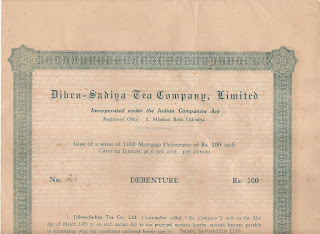I am a collector of early computer manufacturers, so when I go through a sales list or some albums of a dealer, I hope to expect the papers are classified by type of activity. Oops ... "Oh no, they are classified by country", is a common reaction.
Wednesday, May 26, 2010
Wednesday, May 19, 2010
A portrait of a socialist
This is an unissed share of 100 Leva from from the Bulgarian Co-operative Dimitar Blagoev. Period : 1940s.
 Dimitar Blagoev was the founder of the Bulgarian socialism and of the Social-Democratic Workers' Party of Bulgaria, 1891. Much later he transformed his party into the Bulgarian Communist Party.
Dimitar Blagoev was the founder of the Bulgarian socialism and of the Social-Democratic Workers' Party of Bulgaria, 1891. Much later he transformed his party into the Bulgarian Communist Party.
 Dimitar Blagoev was the founder of the Bulgarian socialism and of the Social-Democratic Workers' Party of Bulgaria, 1891. Much later he transformed his party into the Bulgarian Communist Party.
Dimitar Blagoev was the founder of the Bulgarian socialism and of the Social-Democratic Workers' Party of Bulgaria, 1891. Much later he transformed his party into the Bulgarian Communist Party.Saturday, May 15, 2010
Enjoy tea from India
The origins of tea dates from more than 3000 years ago and are to be found in the northern part of Burma and the Yunnan and Sichuan provinces of China. From here the plant was introduced to other countries in the world. In India, tea has been cultivated for consumption and medicinal purposes. In our recent history, tea had been imported for a long time from China.
In 1826, the British East India Company took control of the region from the Burmese King who was defeated in the 1st Anglo-Burmese War. In the 1830s the company had lost its monopoly on trading tea from China. Even though the British had already (re)discovered tea plants in Sadiya in 1823, it took the East India Company several years to be convinced that these plants were genuine. After some years of experimental tea cultivation, the Assam Tea Company was formed in 1840.
Tea planting became popular. From the 1850s the tea industry rapidly expanded and several seed gardens were established. 1856, the Alubari tea garden was opened by the Kurseong and Darjeeling Tea Company. Another four gardens, at Ging, Ambutia, Takdah and Phubsering were established by the Darjeeling Tea Company between 1860 and 1864, and the gardens at Takvar and Badamtam by the Lebong Tea Company. Darjeeling, grown exclusively in India is one of the most renown teas in the world and often termed as “the Champagne of teas”.
In 1826, the British East India Company took control of the region from the Burmese King who was defeated in the 1st Anglo-Burmese War. In the 1830s the company had lost its monopoly on trading tea from China. Even though the British had already (re)discovered tea plants in Sadiya in 1823, it took the East India Company several years to be convinced that these plants were genuine. After some years of experimental tea cultivation, the Assam Tea Company was formed in 1840.
Tea planting became popular. From the 1850s the tea industry rapidly expanded and several seed gardens were established. 1856, the Alubari tea garden was opened by the Kurseong and Darjeeling Tea Company. Another four gardens, at Ging, Ambutia, Takdah and Phubsering were established by the Darjeeling Tea Company between 1860 and 1864, and the gardens at Takvar and Badamtam by the Lebong Tea Company. Darjeeling, grown exclusively in India is one of the most renown teas in the world and often termed as “the Champagne of teas”.
Wednesday, May 5, 2010
"Many-of-a-kind rare certificates"

In the Dutch language, the word “raar” has the following meanings : 1. unusual, 2. strange, and even 3. weird. For economists, goods are rare if these are low in numbers of abundance as opposed to common goods that are almost freely available like the air we breathe.
My first certificate, a plain coal-mining share found on a flea market, made a lot of impression on me and, needless to say, I regarded it as a rare item. And that was what I thought of the other many certificates obtained in this initial period. It was until my first visit at a specialised bourse, where I spotted a pile of certificates of that first share, that I realized that the concept of rarity was not that simple.
Labels:
miscellaneous,
rarity
Subscribe to:
Comments (Atom)


